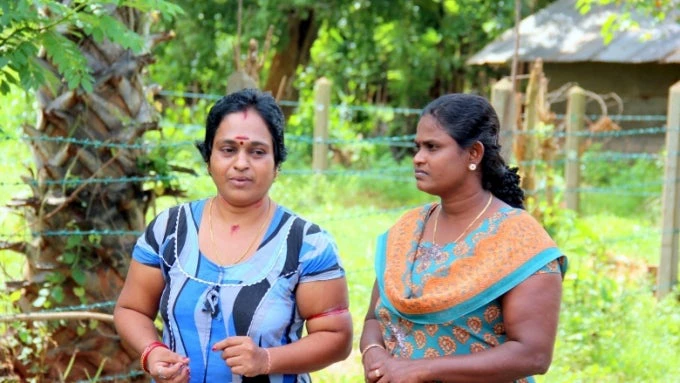
Photo Credit: Joe Qian/World Bank
Jeyaranjini lives near Kilinochchi in Northern Sri Lanka with her husband and daughter. They have been rebuilding their lives through the North East Local Services Improvement Project (NELSIP), which uses a Community Driven Development (CDD) approach to tailor projects based on community needs in this conflict affected region.
The project has helped build 611 km of roads, 23 km of storm drains, 400 community public spaces such as markets, parks, and playgrounds, as well providing improved access to water and electricity across Sri Lanka.
“Each community member used to be alone, but now we learn, exchange ideas, and make decisions together,” she said.
South Asia has a strong tradition of local participation
Let me offer a couple of other examples: Nepal’s Self Governance Act in 1999 decentralized services delivery to villages and districts. In Afghanistan, Community Development Councils (CDCs) receive funds, in which they then manage to support their villages.
In post-disaster contexts, CDD has shown to be fast, flexible and effective at re-establishing basic services. In fragile or conflict-affected states (FCS), the approach has also helped rebuild trust within communities, and between communities and governments.
Projects incorporating CDD approaches give control over planning and investments to community groups, and aim to empower communities to deliver services to the poor and vulnerable.
CDD principles can contribute to the realization of the 17 Sustainable Development Goals (SDGs), a roadmap for the international development community to promote sustainable economic, social, and environmental development by 2030.
Currently, the World Bank has 41 active CDD projects worth $6.1 billion in South Asia, including 21 projects in India worth $4.2 billion.
The Government of India’s ambitious $22 billion program - the Swachh Bharat Mission – aims to achieve universal access to sanitation and rid the country of open defecation by 2019. The World Bank is supporting it with a $1.5 billion loan and technical assistance.
Open defecation is a serious issue in India: one in every 10 deaths in the country is linked with poor sanitation and hygiene; about 38% of all children under 5 years of age are stunted and half of these are due to poor sanitation and open defecation.
Lessons learned from earlier programs shifted the program’s emphasis from the physical construction of toilets – based on the less effective assumption of only “if you build it, they will use it” approach of the past – to also changing people’s habits and behaviors to trigger and sustain the usage of toilets and promote safe sanitation and hygiene practices.
The program taps into community leaders and trains them to serve as role models to trigger behavior change in their communities. The program also introduces knowledge and experience sharing across communities and helps replicate and expand successful approaches.
CASA-1000: New transmission lines will directly benefit neighboring communities
The World Bank and its partners support the Central Asia-South Asia Electricity Transmission and Trade Project, known as CASA-1000. The project will facilitate electricity trade between the Central Asian countries of Tajikistan and the Kyrgyz Republic that have hydropower surplus and South Asian countries– Afghanistan and Pakistan - that are facing electricity shortages.
The program shares the benefits of the new transmission lines and expanded electricity trade with people living along a four-kilometer wide “corridor of influence.” Half of all communities within the corridor will better access electricity with at least 65% of the beneficiaries of community-focused sub-projects being women.
In Tajikistan and the Kyrgyz Republic, Community Support Programs will help families cope with severe winters and, in Afghanistan, will provide electricity access to some communities for the first time.
By incorporating CDD approaches in its projects and programs, the World Bank helps increase their success and accelerate progress toward achieving the SDGs.
The World Bank will continue to support CDD projects on an inclusive basis to help address a variety of urgent needs, including water supply and sanitation, education and health needs, nutrition programs for mothers and infants, rural access roads, and support for micro-enterprises among others.
As substantial experience and evidence suggest, there simply cannot be sustainable development without community involvement.



Join the Conversation